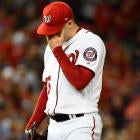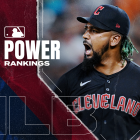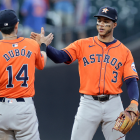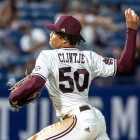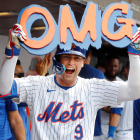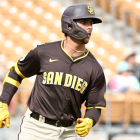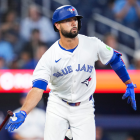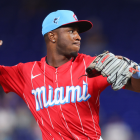Washington - The Washington Nationals and Los Angeles Dodgers engaged in Game 3 of their National League Divisional Series on Sunday night. The two entered tied in the best-of-five series, meaning the winner would be in prime position to advance to the NL Championship Series. That's why it was at least a little surprising when the Nationals elected to start Anibal Sanchez in place of Max Scherzer. The three-time Cy Young winner had pitched in relief in Game 2, but had otherwise seemed likely to go in Game 3.
The Nationals lost Game 3, and the roots of the defeat can be traced directly to the same deliberate pitching strategy that led to Washington's previous postseason wins and Sanchez's start.
To be clear: the defeat wasn't due to Sanchez's involvement. When Davey Martinez said before the game that Sanchez didn't receive enough credit for his season, he had a point. Sanchez posted a 119 ERA+ over 30 starts this year, and more than did his job on Sunday by holding the Dodgers to one run over five innings while fanning nine. He carved through the Los Angeles lineup the way command artists do on their best days: mixing, matching, outwitting, and generally displaying a preternatural ability to put the ball where they darn well please.
Where things went south for the Nationals was the sixth inning, when they summoned Game 1 starter Patrick Corbin to maintain a 2-1 lead. Corbin, to put it kindly, did not:
All of the @Dodgers 7 runs scored in the 6th inning came with 2 strike counts and 2 outs in the inning.
— MLB Stats (@MLBStats) October 7, 2019
No team has ever done that in a #postseason inning. pic.twitter.com/7mbYykahMW
By the end of the half inning, the Dodgers led by an 8-2 margin and Washington's win expectancy had dipped from 61 percent to 3 percent. Corbin didn't have it. You can read more about the inning and how it played out here, but the major moments included two-run doubles by Russell Martin and Enrique Hernandez and a three-run home run by Justin Turner.
Game 3 essentially showed the downside of the Nationals' starter-heavy strategy, the same one the Boston Red Sox deployed to great effect last fall. Throughout Boston's title run, they had Chris Sale make one relief appearance in the ALDS; Nathan Eovaldi and Rick Porcello make one apiece in the ALCS; and then kept Eovaldi in the bullpen for the World Series while also requesting additional outings from Sale, David Price (one), and Eduardo Rodriguez (two).
One difference between those Red Sox and these Nationals -- besides our certain knowledge of Boston's fate -- is that the Nationals required a win in the Wild Card Game to reach this point. That's when the Nationals first tasked an off-day starter -- then Stephen Strasburg -- with working out of the bullpen. Strasburg later started Game 2 of this series on short rest, and fared quite well before giving way to Scherzer, who is expected to start Game 4.
The Nationals' adaptation of the Red Sox's approach is need-based, of course. The Nationals have few relievers they trust in high-leverage spots -- arguably only Sean Doolittle and Daniel Hudson -- meaning they have to cover for the underbelly of their bullpen. It's a good idea on paper, and clearly it's worked to great effect. It's also an idea that asks a lot of their three aces -- to be sharp not just for their starting assignments, but also throw-day relief appearances.
Eventually, someone was going to falter. That it was Corbin in Game 3 is a particular bummer, because it takes the option off the table for a must-win Game 4.
Scherzer has to deliver again -- not just five or six innings, but perhaps more, and in dominating fashion. The Nationals have few other options. Using Strasburg on short rest again would eliminate him from starting Game 5. Sanchez and Corbin, meanwhile, wouldn't seem to be available for more than a relief appearance in a winner-take-all contest.
The Nationals are, in a sense, in a more extreme position of their state throughout the postseason: relying on a starter to bail out an uninspiring bullpen. The difference come Monday is Scherzer won't have backup.









